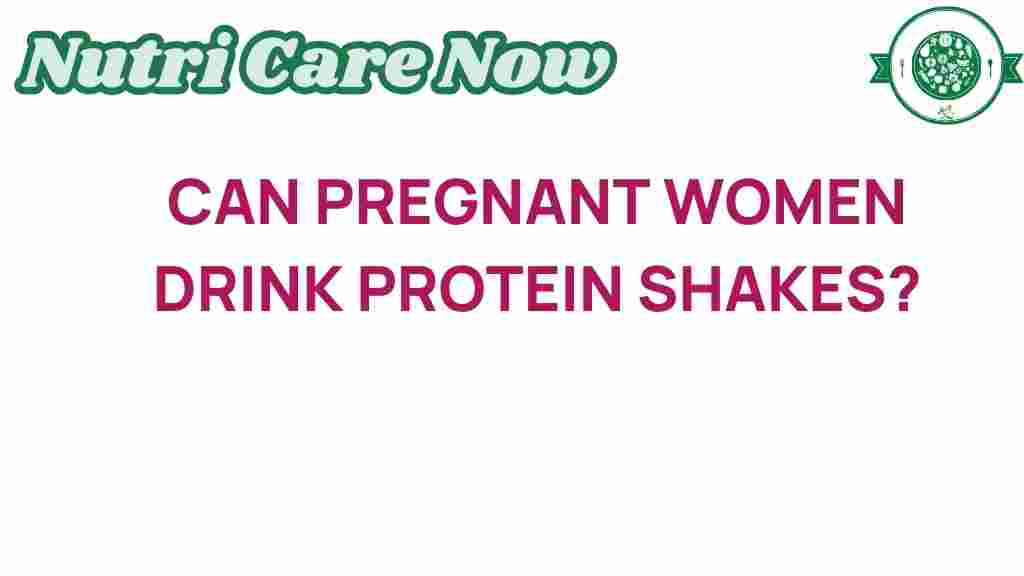The Protein Shake Dilemma: Are They Safe for Pregnant Women?
Pregnancy is a time of profound change, both physically and emotionally. As expectant mothers navigate various aspects of maternal health, nutrition becomes a crucial topic. One of the pressing questions many pregnant women have is about the safety and nutritional value of protein shakes. This article delves into the protein shake dilemma, exploring their safety during pregnancy, their nutritional benefits, and how they fit into a healthy diet.
Understanding Protein Shakes
Protein shakes are dietary supplements designed to provide a convenient source of protein. They are typically made from protein powders derived from various sources, including:
- Whey
- Casein
- Soy
- Pea
- Rice
These shakes can be beneficial for individuals looking to increase their protein intake, but during pregnancy, the focus shifts to safety and overall maternal health.
Nutritional Needs During Pregnancy
During pregnancy, women have increased nutritional needs to support the developing fetus. The recommended daily intake of protein for pregnant women is about 75 to 100 grams, depending on factors such as pre-pregnancy weight and activity level. Protein plays a vital role in:
- Cell growth and development
- Hormone production
- Immune function
It’s essential for pregnant women to get their protein from a variety of sources to ensure they are also getting a balance of other nutrients.
Are Protein Shakes Safe During Pregnancy?
The safety of protein shakes during pregnancy depends on several factors, including the type of shake, the ingredients, and the overall dietary choices of the mother. Here are some key considerations:
- Quality of Ingredients: Always opt for high-quality protein powders that are free from harmful additives, artificial sweeteners, and high levels of heavy metals.
- Consulting Healthcare Providers: Before incorporating protein shakes into your diet, it’s crucial to discuss with your healthcare provider to ensure they align with your prenatal care plan.
- Whole Food Sources: Aim to prioritize whole food sources of protein, such as lean meats, fish, eggs, dairy, legumes, and nuts, and use shakes as a supplement rather than a primary source.
Benefits of Protein Shakes During Pregnancy
When chosen wisely, protein shakes can offer several benefits for pregnant women:
- Convenience: Protein shakes provide a quick and easy way to boost protein intake, especially for women who experience nausea or have difficulty eating solid foods.
- Nutritional Support: Many protein powders are fortified with essential vitamins and minerals, which can support overall maternal health.
- Weight Management: Protein can help manage weight gain during pregnancy by promoting satiety, making it easier to maintain a healthy diet.
Choosing the Right Protein Shake
When selecting a protein shake, consider the following tips to ensure safety and nutritional value:
- Check Labels: Look for protein shakes with natural ingredients and minimal processing. Avoid those with high sugar content or artificial additives.
- Opt for Plant-Based Options: If you are concerned about dairy or animal-based proteins, plant-based protein shakes can be a nutritious alternative.
- Moderation is Key: Use protein shakes as a supplement and not a replacement for whole foods. Balance your diet with a variety of nutrients.
Health Tips for Expecting Mothers
In addition to considering protein shakes, here are some general health tips for pregnant women:
- Stay Hydrated: Drink plenty of water to support overall health and digestion.
- Eat a Balanced Diet: Focus on a variety of foods, including fruits, vegetables, whole grains, lean proteins, and healthy fats.
- Regular Exercise: Engage in safe physical activity as recommended by your healthcare provider.
- Take Prenatal Vitamins: Ensure you are getting adequate folic acid, iron, and other essential nutrients through prenatal supplements.
Potential Risks of Protein Shakes During Pregnancy
While protein shakes can be safe for many women, there are potential risks to consider:
- Excess Protein: Consuming too much protein can strain the kidneys and lead to dehydration. It’s essential to stick to recommended protein intake levels.
- Allergies and Sensitivities: Be aware of any allergies or intolerances to ingredients in protein shakes, such as dairy or soy.
- Contaminants: Some protein powders may contain harmful substances, such as heavy metals or contaminants. Always choose reputable brands.
Common Troubleshooting Tips
If you experience any issues with protein shakes during pregnancy, consider these troubleshooting tips:
- Nausea: If protein shakes trigger nausea, try consuming them in smaller amounts or mixing them with other foods.
- Digestive Discomfort: If you experience bloating or discomfort, consider switching to a different protein source or trying a plant-based shake.
- Unsure About Ingredients: Always read labels carefully and consult your healthcare provider if you have any concerns about specific ingredients.
Conclusion: Making Informed Dietary Choices
Protein shakes can be a safe and convenient way to ensure adequate protein intake during pregnancy, provided they are chosen wisely and consumed in moderation. Always prioritize whole food sources of protein and consult with your healthcare provider to make informed dietary choices that support your maternal health.
For more information on nutrition during pregnancy, check out this comprehensive guide that covers essential dietary choices.
Ultimately, every pregnancy is unique, and what works for one woman may not work for another. By focusing on wellness, safety, and balanced nutrition, expectant mothers can navigate the protein shake dilemma with confidence.
For further reading on prenatal care and nutrition, visit the CDC’s pregnancy nutrition page.
This article is in the category Health and created by NutriCareNow Team
